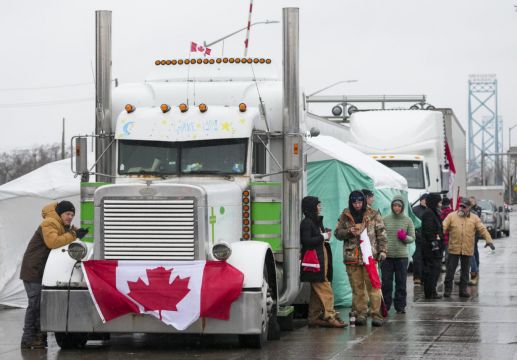Canadian truckers protesting over the country’s Covid-19 restrictions are dismantling their last remaining blockade along the US border, an official has said.
Meanwhile, the siege of Ottawa appears to be heating up.

The federal official says the final blockaders are leaving Emerson, Manitoba, opposite North Dakota, and border authorities hope to reopen the crossing in the afternoon.
At the same time, police in Canada’s capital are telling truckers who have clogged Ottawa’s streets that it is time for them to leave too.
Authorities began handing out notices and threatening arrests near the Parliament building where the biggest group of protesters is entrenched.
The warnings came just days after Prime Minister Justin Trudeau invoked the emergency law.
Since late January, protesters in trucks and other vehicles have jammed the streets of the capital and obstructed border crossings, decrying vaccine mandates for cross-border truckers and other Covid-19 precautions and condemning Mr Trudeau’s Liberal government.
The protests have drawn support from right-wing extremists and have been cheered on and received donations from conservatives in the US, triggering complaints in some quarters about America being a bad influence on Canada.
As the crisis appeared to heat up in Ottawa, the premiers of two Canadian provinces and 16 US governors sent a letter to Mr Trudeau and US President Joe Biden calling on them to end their nations’ requirements that truckers crossing the border be vaccinated.
The bumper-to-bumper demonstrations by the so-called Freedom Convoy have infuriated many Ottawa residents, who have complained of being harassed and intimidated on the clogged streets.
Police in Ottawa were optimistic they could gain control in the coming days after Mr Trudeau invoked the Emergencies Act on Monday.
Over the past weeks, authorities have hesitated to move against the protesters around the country, citing in some cases a lack of manpower and fears of violence.
Mr Trudeau’s decision came amid growing frustration with government inaction. Ottawa Police Chief Peter Sloly lost his job this week after he failed to move decisively against the demonstrators.
As of Tuesday, Ottawa officials said 360 vehicles remained involved in the blockade in the city’s core, down from a high of roughly 4,000.
“They don’t want to give this up because this is their last stand, their last main hub,” said Michael Kempa, a criminology professor at the University of Ottawa.
Even after the warnings, a few protesters roasted a pig on the street in front of Parliament, and a child played with blocks in a small playground area on a road lined with trucks.
An Ottawa child welfare agency advised parents at the demonstration to arrange for someone to take care of their children in the event of a police crackdown. Some protesters had their youngsters with them.
Police in the capital appeared to be following the playbook that authorities used over the weekend to break the blockade at the economically vital Ambassador Bridge connecting Windsor, Ontario, to Detroit.
Police there handed out leaflets informing protesters they risked arrest.
After many of those demonstrators left and the protest had dwindled, police moved in and made dozens of arrests. The blockade there had disrupted the flow of goods between the two countries and forced the car industry on both sides to curtail production.







